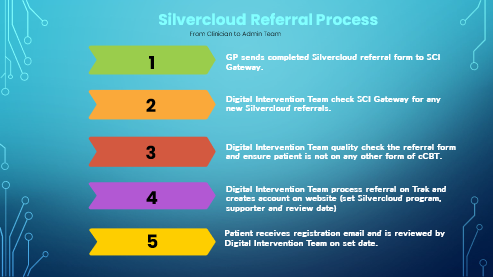cCBT and Psycho-educational (self-referral) Programmes
The cCBT modules are highly effective on-line treatment programmes, recommended by SIGN and NICE, with a suite of computer-based options for patients in Lothian. The programmes are based on cognitive behavioural therapy, mindfulness, and positive psychology. They are interactive and very flexible, using either phone or tablet devices. Patients undertaking these cCBT modules also receive support during the programme and further assessments using standard questionnaires (PHQ-9, GAD7).
The modules are delivered through the SilverCloud programme;
Standard cCBT for those with mild to moderate anxiety, depression or Generalise Anxiety Disorder (GAD)
cCBT for those with anxiety and depression, and co-existing mental health problems:
- Health anxiety
- OCD
- Panic
- Perinatal wellbeing issues
- Phobia
- Social anxiety
Those who also have a mild-moderate anxiety (including phobias or panic) or depression and co-morbidity with a long-term condition:
- Chronic pain
- Coronary heart disease
- Diabetes – types 1 & 2
- Lung conditions including COPD
- Rheumatoid arthritis (note that this is for co-existing depression only).
Self-referral structured programmes for anxiety or insomnia:
SilverCloud also offers psycho-educational modules to which patients can self-refer to support wellbeing. These do not teach CBT though are aligned to those principles. They include:
- Covid-19 (‘Challenging Times’)
- Resilience
- Stress
- Sleep.
The Silver Cloud Patient Information Leaflet gives further details.
The cCBT programmes are suitable for patients whether being treated with medication or not, and for patients aged 16 and above. Please see below for full details of who can be referred: criteria differ slightly according to the module.
A co-ordinator will contact those referred into the programme by telephone to encourage their participation, once access information has been provided by email. Support for continued access to the programme and assistance with any technical issues is provided throughout. Patients who do not access /progress will be reminded every four weeks.
The referral protocols require GPs to ask patients for their email address, and for consent for the SilverCloud team to use this to contact the patient. There is Lothian Caldicott approval for this process. The patient will then be sent a code to allow access to the programme. Anyone without an email address will continue to be contacted by telephone.
Suicidal thoughts and Suicide Alerts.
These are infrequent but there is a safety net – please see more details on when the referrer is contacted if suicidal thoughts are expressed.
Patient engagement with cCBT during treatment and discharging to referrer.
The cCBT team will be available during working hours to be contacted by patients, by telephone (10am-4pm)/email. If possible, please give patients the cCBT team contact details: this reduces patient and cCBT team queries back to referrers if email connection has not been established (at which point those details are shared again) – or if there are other early issues.
If patients email or leave a voicemail, those will be responded to by an initial telephone call back the same, or at latest the next, working day (NWD). If patients do not access treatment (processed NWD from referral), cCBT will phone them around 2 weeks later. At around 4 weeks, cCBT will issue DNA-style letters advising them to access/contact within 12wks from referral. If patients access treatment but do not progress/login for around 4 weeks, cCBT team will also issue a DNA style letter.
Prior to any DNA-style deadline the cCBT team will make a final attempt to telephone patients to ensure they are aware their access may be removed, to provide any help or support needed, or, if requested to remove them from the programme. Discharging patients happens via TRAK, based on deadlines issued to patients.
If referrers require any information about patient progress (PHQ9/GAD7, sessions completed, last login) please contact the team on 0131 537 1247 during working hours.
C.M. 05-04-23
This is the SilverCloud referral process:

Who to refer:
Suitable for patients with:
- Mild to moderate depression and/or anxiety: including phobias and panics
- Willingness to be pro-active in their treatment recovery and to use a computer programme
A reading age of 10 to 11 years is needed to complete the programme; much of the material is audio and video based for those who have lower levels of literacy.
Home User Technical Requirements
Patient completing the programme will require the following:
- A stable internet connection
Who not to refer:
Not suitable for patients:
- With active suicidal ideas or plans – refer to relevant service
- Who are unable to read or write English (reading age below 10/11 years)
- In acute phase of psychosis or mania, or with cognitive functioning disorder, e.g. dementia
How to refer:
Please refer through SCI Gateway
Royal Edinburgh>General Psychiatry>Protocol: cCBT Referral
Please include an email address with consent for this to be passed on, and there are reminders on the SCI Gateway protocol to do this. Please avoid any share (work/family) email address wherever possible. Patients who do not have a personal email address will be contacted by telephone.
For those without SCI Gateway access, please, use the SilverCloud referral form and send from any @nhslothian.scot.nhs.uk (or @nhs.net) email addresses to: ccbt@nhslothian.scot.nhs.uk
Alternatively by post or internal mail to:
Digital Interventions
SCBT Clinical Psychology
South Corridor
Western General Hospital
Crewe Road South
Edinburgh
EH4 2XU
- Patients can self-refer for the Wellbeing and Covid-19 psycho-educational modules
- Patients can self-refer for the SLEEPIO (insomnia) and DAYLIGHT (anxiety) programmes.














